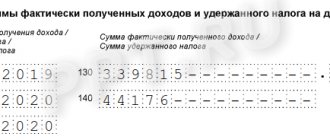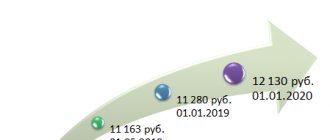On July 1, 2020, changes in legislation came into force, in accordance with which a new remuneration procedure applies. All changes concern exclusively budgetary municipal organizations. According to the new requirements outlined in Law No. 88-FZ of May 1, 2017, the employer is obliged to pay employees according to the new rules. The changes also affected funds that are not financed from the federal budget. In the article we will consider the new rules for paying salaries from July 1, 2020 for budgetary and municipal organizations.
New salary payment rules from July 1, 2020
Important! Since July 2020, municipal companies have no right to pay funds to payment systems such as VISA, Master Card.
In accordance with Law No. 88-FZ of 01.05.2017, from the beginning of July 2020, new criteria for calculating wages came into effect:
- Payments to employees can only be made using a MIR card, and the use of any other cards will be considered illegal.
- If an employee does not have the opportunity to receive funds on a card, then he can receive them at the bank’s cash desk.
These changes concern not only the payment of wages, but also other government payments:
- pensions;
- scholarships;
- sick pay;
- maintenance and remuneration of employees holding public positions.
In addition, as of July 1, 2020, new rules for overtime pay are also being introduced:
- If an employee goes to work on his day off or on a holiday, he receives double payment only once. Let us recall that previously hours of such work were counted twice - as time spent at the workplace in excess of the legally established norm. Moreover, the first 2 hours were paid at 1.5 times the rate, and the remaining hours at double the rate.
- If on a regular working day an employee worked 2 hours more than normal, then payment for this time is made at double the rate.
- Going to work on a day off is paid at double the rate, based on the number of hours worked by the employee.
- If an employee works part-time or part-time, the employer cannot set irregular working hours for him.
How to formalize the change correctly?
According to Art. 57 and 136 of the Labor Code, the employer has no obligation to indicate specific days for payment of wages in the employment contract. He has the right to prescribe them in the internal regulations of the enterprise or a collective agreement.
The procedure for postponing the date of payment of wages directly depends on which document specifies the specific deadlines.
For ease of perception of information, we will consider each of the options in the form of a tabular document:
| The date of receipt of wages is fixed in the document | Procedure for rescheduling |
| Internal regulations (IVR) | The transfer of dates occurs on the basis of an order issued by the enterprise. After the changes, every employed citizen must be familiarized with them against signature. Since PVRs are local regulatory documents, decisions on changes are made by the employer without the consent of employees. If there is a trade union in the company, its opinion must be taken into account when making changes. |
| Collective agreements | If the collective agreement does not contain a clause regarding the procedure for making changes to it, then they are implemented through negotiations. Typically, a special commission is created to amend such agreements. It should include representatives of both parties: the employer and the employees. The results are recorded in a special additional agreement. It contains a free form, but must include new deadlines for receiving payment for work. The additional agreement is sent to the territorial labor authority for registration no later than seven days after signing. The document comes into force from the moment of its publication, not registration. |
| Employment contracts | According to Art. 72 of the Labor Code of the Russian Federation, when the date of salary payment changes, it is carried out by concluding an additional agreement with each employee. If a person does not agree with the change in the terms of the contract, the organization will have to settle it with payment of severance pay in the amount of two weeks’ earnings. With this option, it is imperative to notify employees of the upcoming changes two months in writing. The notification must contain not only the new dates for payment of wages, but also the reasons for the changes being introduced and explanations why the previous deadlines cannot be maintained. |
If dates are recorded in two or three documents at the same time, then changes will have to be made to each of them.
For example, when the date is specified in the rules of procedure and employment contracts, an order is issued and notices are sent to employees two months in advance.
After which additional agreements to the employment contracts are concluded.
Is notice required for employees to reschedule?
An organization is obliged to notify staff about the transfer of wages for work only if a specific payment period is specified in the employment contracts.
Written notices are sent to employees no later than two months in advance.
When the deadlines for receiving payment for labor are agreed upon by the PVR, there is no need to ask the employees for consent; changes are made by order.
However, the employer is obliged to familiarize all personnel with the order.
order
An order to postpone the date of payment of wages is drawn up if the deadlines are determined by the temporary residence permit.
The law does not approve a special form for this document.
However, it must contain the information:
- name of the company and document;
- date and city of compilation;
- in one sentence - what the order is about;
- in which document the changes are introduced and their essence, the date from which the changes are made;
- responsible persons for making changes are appointed;
- manager's signature;
- a list of persons who must familiarize themselves with the order and their visas.
order to change the timing of payment of wages - word.
To familiarize employees, familiarization sheets are attached to the order, and personnel visas are included in them.
The legislative framework
Payment of wages to employees employed in the budgetary and municipal spheres, as well as in extra-budgetary funds, occurs in accordance with labor and federal legislation and is regulated by the following regulatory documents:
- Law No. 272-FZ, which regulates the employer’s liability to employees in case of failure to meet deadlines for payment of wages. The law also contains the employer’s obligations, according to which he is obliged to adjust payment dates.
- Law No. 125-FZ, which amends the Labor Code of the Russian Federation regulating the calculation of wages.
- Code of Administrative Offenses of the Russian Federation (Part 6, Article 5.27), which regulates the employer’s liability in case of non-compliance with legislative norms on wages.
- Article 136 of the Labor Code of the Russian Federation, which contains the terms for accruing funds to employees of public sector sectors.
- Law No. 88-FZ.
| ★ Best-selling book “Accounting from scratch” for dummies (understand how to do accounting in 72 hours) > 8,000 books purchased |
When should salaries be paid?
From October 3, 2016, the content of Article 136 of the Labor Code of the Russian Federation was adjusted, requiring the employer to designate the days of payment of wages in two amounts up to and including the 15th day from the end of the period for which the wages were calculated.
At the same time, there is a rule according to which the minimum interval between payment dates is established - half a month. Taking both requirements into account simultaneously leads to the following procedure for establishing payment deadlines:
- For the first part of the month, the payment date is up to and including the 30th day of this month;
- For the second part – until the 15th day inclusive of the next month.
Yes, definitely. The Labor Code directly states that salaries are paid “at least every half month.” This means that restrictions are placed only on rarer payments to employees, but not on more frequent ones (letters from the Ministry of Labor of the Russian Federation dated 02/03/2016 No. 14-1/10/B-660, dated 12/06/2016 No. 14-1/B-1226 ).
If you wish, you can issue money not twice a month, but weekly and even daily. However, before switching to a more frequent frequency of salary payments, it is worth considering the feasibility of this: whether such a schedule will be convenient and beneficial for both employees and the employer himself.
Practice shows that this is beneficial for those employers who employ temporary staff; in other cases, the benefits of more frequent payment of money are completely unobvious, if not completely absent.
For information on how to conclude an agreement with a temporary worker, read the material “Art. 59 of the Labor Code of the Russian Federation: questions and answers.”
The weekly payment does not excite the staff either: according to repeated statistical surveys, the majority of employees would like to maintain a 2-time salary schedule.
Changes effective July 1, 2020
| Payment of wages until July 1, 2020 | Payment of wages from July 1, 2020 |
| To receive wages, workers could use any bank cards (Visa, Master card) Work on weekends and holidays was paid at double the rate, plus these hours were also counted as overtime | It is prohibited to use non-state payment systems and wages must be transferred only to the MIR card. It is also possible to receive money at the cash register In the case of working in a reduced working hours mode, an employee cannot be assigned an irregular working day. Payment for work on a weekend or holiday is made in double amount only once |
Article 136 of the Labor Code of the Russian Federation
The procedure for how salaries should be calculated is described in detail in this article. In particular, the document defines the terms within which the payment of funds due to hired workers must be carried out:
- The employer is required to pay wages within a period of time not exceeding half a month;
- The maximum time interval during which the salary must be paid should not exceed 15 days from the date of completion of the period subject to payment;
- If a day off or holiday falls on the date of actual payment of wages, payments to employees are made the day before;
- Vacation pay must be paid to the employee no later than 3 days before the start date of the vacation.
In addition, in accordance with the content of the article, the employer is obliged to inform employees about all components of the accrued salary in writing. That is, the notification should describe how much was accrued, how much was withheld, what part of the amount is a bonus, vacation pay, sick leave, and how much, ultimately, is payable in person. As for receiving money, the regulatory act in question provides for two options for transferring funds to an employee:
- In hand, at the place of work;
- By transfer to a banking institution to the employee’s current account.
Deadlines for paying salaries according to the new rules
Back in October 2020, new rules for salary transfers were established. Since July 1, 2020, there have been no additional changes, so the terms, as well as the payment procedure, remained the same.
In accordance with changes in legislation in 2020, wages to employees of state, municipal institutions and extra-budgetary funds must be paid at least once every 15 days. The main part of the salary remaining after the advance payment must be paid no later than 15 days from the end of the month for which the salary was accrued.
For example, the employer does not have the right to set the date for payment of an advance on the 20th of the current month, and the basic salary on the 15th of the next month. This is due to the fact that about 25 days will pass between the 20th and 15th, and this will be contrary to legal regulations.
Important! If the organization does not comply with the specified deadlines for paying wages, it faces penalties.
When paying wages to an employee, the following conditions must be met:
- the time between payment of the advance and the basic salary should not exceed 15 days;
- payment of the main part of the salary is made no later than 15 days from the end of the month for which the salary is paid.
When establishing days for payment of wages to an organization, the employer should remember that each month has a different number of calendar days. The following days can be designated as days for salary payment: 20th and 5th; 25th and 10th; 23rd and 7th (
conclusions
Main conclusions:
- The procedure for carrying out the procedure depends on which document regulates the specific deadlines for receiving wages.
- The order is issued only if the deadlines are established by the PVR.
- If the dates of issue are determined by employment contracts, the employer notifies employees two months in advance of the upcoming changes. After this, additional agreements are concluded with each employee.
- When the terms are fixed by a collective agreement: a commission is created, a decision is made to introduce changes, and only after that one additional agreement to the contract is issued.
- Issue days cannot be less frequent than every half month. Payment is made no later than fifteen days after the end of the period for which the salary was calculated.
New rules for paying wages from July 1, 2020 for individual entrepreneurs
Important! If the organization is financed not from the federal or municipal budget, then the changes in the payment of wages that came into force on July 1, 2020 do not affect them.
Thus, entrepreneurs have the right to transfer wages to their employees to a bank card of any payment system, for example, Visa or Master Card, or even to MIR (Read also the article ⇒ The procedure for paying wages to employees from individual entrepreneurs in 5 stages).
How to write an order correctly
Today there is no standard uniform template for all orders on the timing of payment of wages, so employers can write it in any form. In some cases, enterprises use internal document templates approved in the company's accounting policies. But, regardless of which path is chosen, the order must include a number of mandatory information. These include:
- Date of preparation,
- Name of the organization,
- the essence of the order, i.e. exact dates of payment of wages,
- the basis for its writing,
- persons responsible for its execution, indicating their positions and full names.
If any additional papers are attached to the document, they must be noted in a separate paragraph.
New salary payment rules from July 1, 2020 for legal entities
If a legal entity receives funding from the state or municipal budget, then for the payment of salaries from July 1, 2020, the following rules for payment of salaries are established for them:
- the salary is transferred exclusively to the MIR card, while the employee has the right to choose in which bank his salary project will be registered;
- The payment period is specified in the employment (collective) agreement and in the regulations on salary payment.
If the legal entity has nothing to do with budgetary institutions, then wages are paid as usual and are not subject to changes from July 1, 2020.
What are the consequences of violating wage payment deadlines?
The employer's liability for such violations can be of two types: material and administrative.
Administrative liability applies only if the employer is at fault.
Primary administrative punishment (clause 1 of article 5.27 of the Administrative Code):
- warning or fine of 1,000–5,000 rubles. for officials;
- fine for the culprit - individual entrepreneur - 1,000–5,000 rubles;
- fine for the culprit legal entity - 30,000–50,000 rubles.
Repeated administrative punishment (clause 2 of article 5.27 of the Administrative Code):
- disqualification for 1–3 years or a fine of 10,000–20,000 rubles. for officials;
- fine for the culprit - individual entrepreneur - 10,000–20,000 rubles;
- fine for the culprit legal entity - 50,000–70,000 rubles.
Financial liability (Article 236 of the Labor Code of the Russian Federation) is expressed in monetary compensation for each day of delay, calculated from 1/150 of the key rate of the Central Bank of the Russian Federation of the amount due for payment (minus personal income tax). This is the minimum amount of compensation, but the employer has the right to assign a larger amount. No application from the employee is required to receive it - it must be paid along with the delayed amounts.
IMPORTANT! Maternity compensation is paid regardless of whether the employer is to blame for violating salary deadlines.
In what other cases is the employer liable for financial liability? This publication will tell you.










